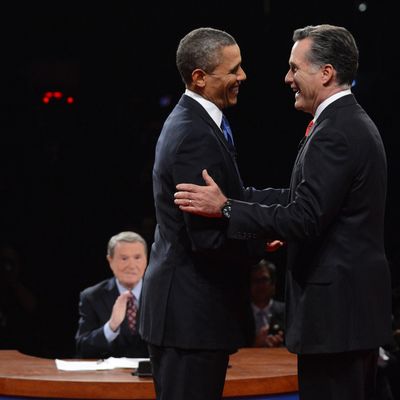
It’s now obvious that Mitt Romney’s debate victory was not merely a superior performance but the kickoff of a strategic decision to reposition himself as a centrist in the campaign’s home stretch. Romney’s repudiation of his 47 percent comments on Sean Hannity’s program last night supplies the clearest signal. After having defended his riff as merely a “not elegantly stated” wording of a sound belief, Romney now calls it completely wrong. It’s interesting to imagine what would have happened if Romney used this obviously prepared retreat during the debate. Possibly it would have awakened Obama more quickly to Romney’s ideological-repositioning strategy. More likely it would have just left him stammering with the same slack-jawed bewilderment many of us felt as we watched Romney transform overnight into the progressive he cast himself as in Massachusetts. That neither Obama nor moderator Jim Lehrer gave Romney a chance to use the high-profile debate for his repudiation was probably a lucky break for Obama, not Romney.
In any case, Romney’s ideological repositioning, rather than the debate itself, is now the central strategic question of the campaign. This is the image Romney has to sell if he is to stand a chance of catching Obama, and this sales pitch is what Obama must discredit.
Will Saletan wrote the definitive exegesis of Romney’s ideological repositioning method. It’s a 14,000-word analysis of how Romney defined and redefined himself on abortion. Romney’s basic method is to strongly highlight whichever aspect of his position is most attractive to his audience at the moment, and then subsequently seize on ambiguities or loopholes in his stance to adopt a new one. Occasionally he goes beyond this to simply misstate his previous position.
Romney’s stance on taxes offers a classic example. During the Republican primaries, he proposed a 20 percent tax rate cut. He also said he would make up the revenue by closing tax deductions, but the rate cut was the headline, and when pressed, Romney would pitch his plan as an across-the-board tax cut for everybody:
Now he is emphasizing the tax deduction closings and downplaying the rate cuts. That’s the classic change of emphasis. But he’s also throwing in a straight-out lie, insisting his plan would not cut effective tax rates for the rich when his own campaign’s favored analyses say it would.
Obama’s approach here is not to cast Romney as a flip-flopper. It’s to tie him down to his platform and his statements, to convince voters that the Romney who emerged in the first debate is not the real one. This is hardly insurmountable. Part of what makes Romney’s horrific 47 percent riff so devastating is that he said it behind closed doors. That the real Romney is most authentically revealed when he doesn’t think he’s being watched is both highly intuitive and very probably true.
Obama’s openings, aside from the 47 percent comments, are to seize on the gaping voids in Romney’s platform. He proposes a massive, regressive tax rate cut, but won’t say how he’ll pay for it. He proposes to repeal Dodd-Frank, but doesn’t say what he’ll put in its place. He pledges to repeal Obamacare, but won’t commit himself to any remotely comprehensive replacement. What he offered instead at the debate is broad rhetorical commitments. He approves of regulation and wants the rich to pay the same tax levels (or higher!), and feels for the plight of the uninsurable. But he’s leaving himself every opening to lurch back right if he wins — to declare his policy commitment binding and his rhetorical gestures moot. That’s why, for instance, Grover Norquist remains ecstatic with Romney. And that was why Norquist and other conservatives didn’t sweat George W. Bush’s many rhetorical concessions to the center in 2000. They’re confident they will still own Romney if he assumes the presidency, and they’re probably right.






























